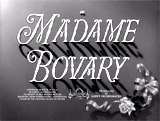
|
Madame Bovary (1949)
In director Vincente Minnelli's version of the classic
Gustave Flaubert novel, a tragic melodrama with a musical score by
Miklós Rózsa - it was a controversial film for its
portrayal of an adulterous wife involved in self-destructive romances
in 19th century France:
- to appease censors, the film was structured as a
framing story with a prologue and epilogue - of author Gustave
Flaubert's (James Mason) 1857 courtroom trial (his novel was charged
with obscenity as "an outrage against public morals and established
custom"); he defended his scandalous novel before a French
jury by describing the story of his banned inflammatory and fictional book
about a character who was considered "a disgrace to France
and an insult to womanhood"; in the epilogue, Flaubert was
eventually acquitted of all charges (described in scrolling text
at the film's end)
- the scene of Flaubert's defense of his fictional creation: "Gentlemen,
I do deny that I have made any attack upon public morality. I have
shown you the vicious, yes, for the sake of understanding it, so
that we may preserve the virtuous. Furthermore, I deny that Emma
Bovary is a monstrous creation of my degenerate imagination. Monstrous
she may be, but it was not I who created her. Our world, your world
and mine, created her, as I shall attempt to demonstrate. There are
thousands of Emma Bovarys. I only had to draw from life. And there
are hundreds and thousands of women who wish they were Emma Bovary,
and who have been saved from her fate, not by virtue, but simply
by lack of determination"
- the early flashback - Flaubert's (voice-over) narrated
description of Emma's (Jennifer Jones) convent youth, when the motherless
girl attended a convent: "Emma Roualt, motherless, had attended
a convent in the provincial city of Rouen. Emma at first detested
the convent. The scales, the eternal scales, when she might have
been learning love songs. The discipline, the dreadful conformity.
The eternal uniform, when a girl's young body is budding. Perhaps
it was the discipline itself and Emma's discontent that drove her
to dreams, and taught a lonely girl to live within herself. For these
became the happy years, these convent years, when a young girl's
mind could wander"
- as the narration proceeded, it described how Emma
lived in a fabricated fantasy world of romantic love novels (illegally
slipped into the convent for her to read): "She lived in a world
of love, lovers, sweethearts, persecuted ladies fainting in lonely
pavilions, horses ridden to death on every page, gentlemen, brave
as lions, gentle as lambs, always well-dressed and weeping like fountains.
Oh, love in Italy! Oh, love in Spain!" - her dreamy obsessions
about another "faraway" life became: "Happiness. Fashion.
High Romance...To believe in Cinderella"
- the film's most celebrated, beautifully-choreographed
sequence was a high-society ball held by wealthy, aristocratic nobleman
Marquis D'Andervilliers (Paul Cavanagh), attended by naive, kind,
provincial doctor Charles Bovary (Van Heflin) and his wife Emma Bovary
(Jennifer Jones) wearing an exquisite white linen gown; while her
husband was in the billiards room and heavily drinking champagne,
Emma was courted by a number of admirers for dances
- one of Emma's partners was handsome, suave aristocratic
landowner Rodolphe Boulanger (Louis Jourdan) - tracked with a kinetic,
dizziness-inducing camera as they beautifully twirled around the
ballroom; when she complained that she was exhausted, hot, and couldn't
breathe ("I would like to stop, please. I can't breathe. I'm
going to faint"), Rodolphe ordered the windows to be broken,
as the soused Charles stumbled onto the dance floor repeatedly calling
out Emma's name; he became lost in the twirling partners, but was
finally able to barge in to ask his embarrassed wife to dance ("Hey,
I want to dance with my wife") - it caused her extreme humiliation
and she ran out of the ball-room
- much later, the scene of Emma's sweaty and painful
death after suicidally swallowing arsenic (she had stolen from an
apothecary) - she was devastated after the stresses of further affairs
and rejections, the complete deterioration of her marriage with her
husband, and indebtedness had all taken their toll; she died in her
husband's arms: ("I hurt Charles, I hurt inside...Always trying
to save me. Why are you always trying to save me?...Where are we,
Charles? Is this our house?...I'm going to make you the most beautiful
home, like, like pictures in magazines when I was a child. There's
not something wrong with things being beautiful, is there?...What
did I do? Hold me, Charles. Hold me")
|
Emma's Painful Suicidal Death Scene
|
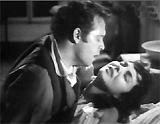
|
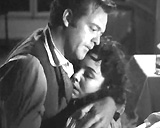
|
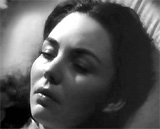
|
- after Emma's demise and the administration of last
rites by a priest (and a pardon for the suicide), Flaubert continued
his voice-over narration: "And so it was. A woman had been
born into this world and had died young. She had touched on numerous
lives - some lightly, some not so lightly. Some despised her. Some
mourned her a little. Some profited by her. And then, of course,
there were those she had ruined, who would never cease to love
her"
- the final scene returned to the courtroom trial,
where Flaubert successfully defended the right to publish his work
to the presiding judge and court; his final lines of dialogue summarized
his defense: "Now there are those who are offended by her, and
who see in Emma Bovary's life an attack upon public morality. Gentlemen
of the court, I maintain that there is truth in her story, and that
a morality which has within it no room for truth is no morality at
all. Men may dislike truth. Men may find truth offensive and inconvenient.
Men may persecute the truth, subvert it, try by law to suppress it.
But to maintain that men have the final power over truth is blasphemy
and the last illusion. Truth lives forever. Men do not"
- a scrolling epilogue described the outcome: "Gustave
Flaubert's acquittal, almost a century ago, was a triumphant moment
in the history of the free mind. His masterpiece, 'Madame Bovary,'
became a part of our heritage, to live - - - like truth itself -
- - forever."
|
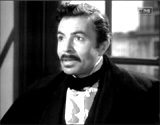
Gustave Flaubert (James Mason): "I deny that Emma
Bovary is a monstrous creation"
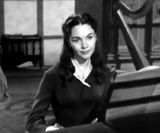
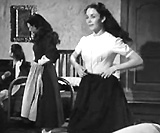
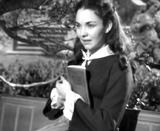
Young Emma (Roualt) in Convent
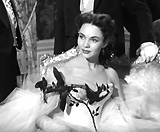
Emma Bovary
(Jennifer Jones)
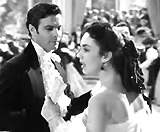
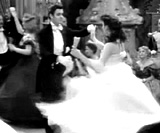
At The High-Society Ball, Waltzing with Rodolphe
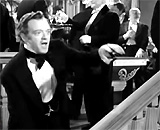
Emma's Soused Husband Charles at Ball
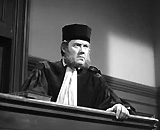
The Trial's Presiding Judge
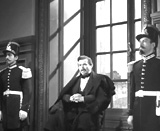
Flaubert's Ending Summary
|











